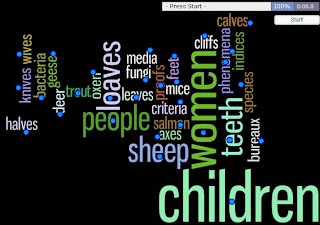Regular Plurals
The plural of most nouns are formed by adding 's' at the end of the singular noun: cup - cups, snake - snakes, bicycle - bicycles. However, there are some special cases.
We add 'es' to nouns that end in s, x, z, ch, or sh.
bus - buses
box - boxes
waltz - waltzes
match - matches
brush - brushes
We also add 'es' to nouns ending with o.
echo - echoes
tomato - tomatoes
potato - potatoes
hero - heroes
However, not all nouns ending with o have an -es ending.
For nouns ending in a vowel + o, we just add an s.
kangaroo - kangaroos
radio - radios
zoo - zoos
The following words also have just an s added. Most 'new' words also follow this rule.
commando - commandos
concerto - concertos
Eskimo - Eskimos
kilo - kilos
logo - logos
photo - photos
piano - pianos
solo - solos
soprano - sopranos
Some words ending with an o can have either s or es added.
tornado - tornados, tornadoes
mosquito - mosquitos, mosquitoes
volcano - volcanos, volcanoes
For nouns ending in a consonant + y, we remove the y and add ies.
baby - babies
city - cities
ferry - ferries
lady - ladies
party - parties
strawberry - strawberries
However, if the y is preceded by a vowel, we just add an s.
holiday - holidays
monkey - monkeys
boy - boys
Irregular plurals
For irregular nouns ending in f or fe, we remove the f or fe, and add ves.
calf - calves
half - halves
knife - knives
leaf - leaves
thief - thieves
wife - wives
loaf - loaves
Some nouns ending in f are considered regular.
belief - beliefs
cliff - cliffs
proof - proofs
These nouns below, mostly of old English origin, are irregular plurals that do not follow the other spelling rules. The plurals have a different vowel sound from its singular version.
foot - feet
goose - geese
man - men
mouse - mice
person - people
tooth - teeth
woman - women
Some nouns referring to groups of animal have the same singular and plural form.
bison - bison
deer - deer
moose - moose
salmon - salmon
sheep - sheep
trout - trout
Words of foreign origin have special plurals, which generally follow the original rules.
analysis - analyses
bacterium - bacteria
cactus - cacti
fungus - fungi
criterion - criteria
medium - media
Here are some games for you to practise. These games have been designed to be played more than once if you want to reap the benefits. The objective is to keep on improving your scores, and you will learn the plural forms even if subconsciously.
The list of nouns changes each time you play a new game!
Point and click the regular plural form




level 12, 458 points :-$ :-D
ReplyDeleteWell done, Fer!
ReplyDelete